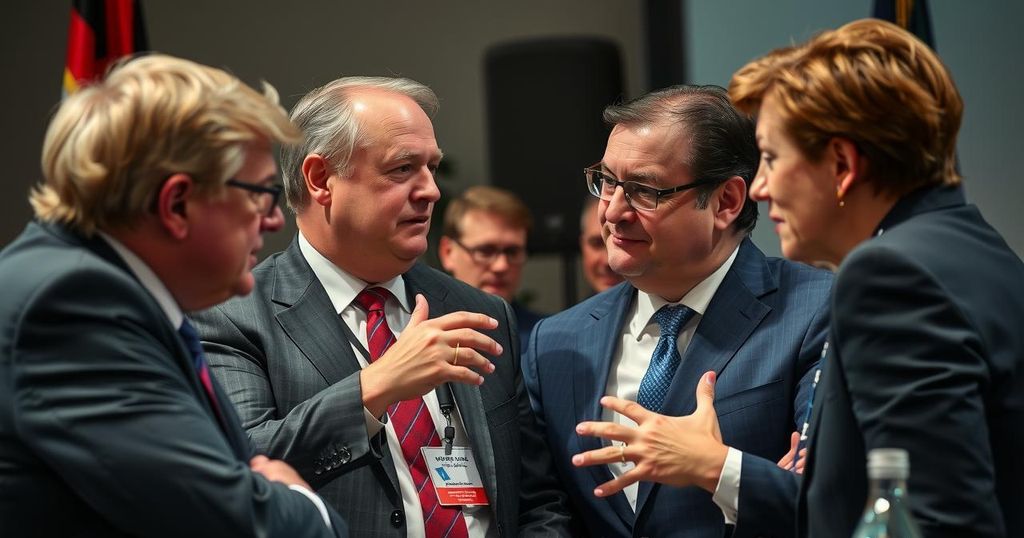Political Turmoil in Germany: A Nation on the Brink of Change

Chancellor Olaf Scholz’s coalition government in Germany faces collapse, necessitating early federal elections on 23 February. The Bundestag debate highlighted severe political hostilities, reflecting the current economic crisis and the rise of extremist parties undermining German unity. Additionally, the potential impact of Donald Trump’s return to power looms over German political stability, stressing the need for a collaborative approach among political leaders during these critical times.
The Bundestag debate on Monday marked a significant moment in German politics, as Chancellor Olaf Scholz faced an unprecedented level of hostilities from opposition leaders. As Scholz’s coalition government faltered, resulting in a vote of confidence failure, early federal elections have been scheduled for 23 February. Scholz’s criticisms targeted the Free Democrats for lacking the moral fortitude required for governance, while his adversaries responded with equally caustic remarks, suggesting a decline in decorum reflective of the heightened tensions faced by German democracy.
Germany is grappling with severe economic crises, stemming from rising energy costs and poor management decisions. The automotive industry’s dominance is threatened, particularly by the growing competition from Chinese electric vehicle imports. If these challenges adversely impact automotive exports, the resulting economic downturn could have profound political implications, reverberating beyond the automotive sector into broader German society.
Compounding these difficulties, the rise of extreme political factions within Germany is indicative of a significant shift in public sentiment. The far-right Alternative for Germany (AfD) and the far-left Bündnis Sahra Wagenknecht (BSW) are leading campaigns that undermine support for Ukraine, contrasting starkly with Germany’s earlier commitment to international solidarity. This political polarization fosters an environment ripe for instability, with the potential to shift power dynamics favorably towards far-right and far-left entities.
The immediate context for German politics is fraught; the nation prepares for snap elections during a time of international uncertainty, especially with the looming possibility of Donald Trump’s return to the US presidency. Political paralysis in Berlin coincides with potential upheaval in Paris, where France’s strife under President Emmanuel Macron bears heavily on the entire continent’s future. Should France falter, the repercussions for European unity could be dire, especially amid the rising influence of populist leaders.
Nevertheless, a notable positive development arises from Russia’s actions in Ukraine, as Eastern European states such as Poland and the Baltic nations emerge as crucial players in European security arrangements. Their proactive stance contrasts sharply with the instability of larger nations like Germany and France, revealing a transformed geopolitical landscape. This shift highlights a pressing need for Germany to reconsider its defense strategy and be forthright with its citizens regarding the fiscal commitments required for a robust military posture.
Germany’s political landscape is in turmoil, with Chancellor Olaf Scholz’s coalition government collapsing amid severe economic crises, creating a call for early elections. This situation is exacerbated by internal and external pressures, including rising extremist sentiments on both sides of the political spectrum, which question Germany’s commitment to international partnerships, such as support for Ukraine amidst increasing competition from China in critical economic sectors like automotive manufacturing. The impending elections reflect a larger struggle within Germany over fundamental democratic principles and governance, potentially influencing broader European stability even as new political dynamics emerge in the east.
In conclusion, Germany finds itself at a critical juncture as it approaches early federal elections. The combination of internal political strife, an economic crisis, and the resurgence of extremist political movements places the principles of German democracy under scrutiny. The electorate’s decisions will not only determine the fate of Scholz’s government but also shape the future direction of German politics and its role within the European context. There is an urgent need for collaboration among political leaders to restore confidence and stabilize governance amid escalating international challenges.
Original Source: www.theguardian.com







